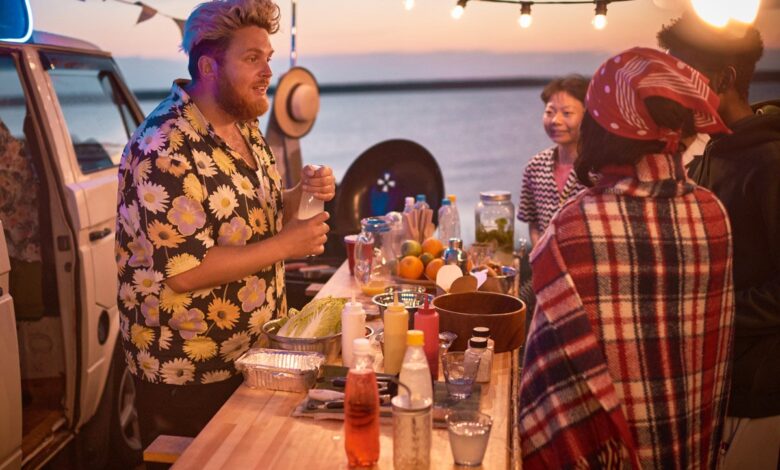
Freelance Bartending Side Gig Stirs Up Extra Cash
[ad_1]
Freelance bartending is a great side gig for the holidays that doesn’t require bartending school and can earn you good extra money whether you’re working large events or something more intimate.
Freelance bartenders can make anywhere from $20 to $50 per hour — and sometimes more — according to freelance bartenders we interviewed. That’s before tips, and those can bring in serious extra cash.
“You definitely can make really good money bartending if you’re at the right place and you network,” said Nicole Freimuth, a freelance bartender in Chapel Hill, N.C.
Do you know folks who want to hire bartenders at their private events? Friends who don’t want the hassle of mixing drinks while mingling at their own party? Read on to learn the ins and outs of being a freelance bartender.
Contents
Do You Have What It Takes to Be a Freelancer Bartender?
While freelance bartenders aren’t required to get special training, they do need other key skills such as a good personality, networking chops, a steady hand and a willingness to cut people off if needed.
“It takes more than just making drinks to make a good buck,” said Keisha Harrison, who operates Mixing Val’s Mobile Bar in Washington, D.C. “It’s how you interact with guests and how you make drinks that make a great bartender.”
And a few theatrics don’t hurt in the bartending services business.
At a bachelorette party for a bride-to-be named Chi who loves the color pink, Harrison offered a signature “ChiTini,” which was a Cosmopolitan in a martini glass rimmed with pink sugar. When tending bar for a lingerie party, Harrison brought champagne glasses with pink fur around the stems. And for a ’70s party, she donned a big, beautiful wig reminiscent of the era.
But she also knows when to tone it down.
“You have to watch people’s body language and know if they want to chat or just get their drink and go,” Harrison said. “You’ve got to remember there’s usually a guest of honor and you don’t want to take any attention away from him or her.”
Getting Started as a Freelance Bartender at Private Parties
So you think you’ve got the basics down but you’d like to develop your bartending know-how before joining the world of bartending services.. There are ways to learn the trade without paying for a course.
If you’re not in the service industry but can mix a good drink and chat up guests, offer to tend a couple parties for free then use those hosts as references to scheduled paid private parties.
Freimuth learned to tend bar when she was waitress at a restaurant at age 21. She’s now 38, and credits freelance bartending as helping her buy a house several years ago.
“A lot of times, when you’re working at a restaurant someone is willing to train you on the bar,” Freimuth said. “You have to bartend for at least six months before you get really good at it.”
And be prepared to memorize a lot of recipes, she said.
Harrison, 25, attended bartending school for several months when she was 20, but said she perfected her craft working at Starbucks. That’s where she learned to pick up her speed and experiment with mixing syrups to learn flavor profiles — great preparation for being a freelance bartender.
How Much Can You Make for Bartending Services?
Harrison charges $20 an hour for a three-hour party (the most typical gig; fees can increase if it’s longer). With 30 to 40 people there she walks out with tips between $200 and $300. Add that up and it’s $86 to $120 an hour.
Freimuth charges a higher hourly rate, but her tips are a little lower. “I charge $50 an hour for a three-hour party, so I know I’m making at least $150,” she said. “Tips depend on the crowd. It can be anywhere from an extra $50 to $100.”
Do the math and that equates to $66 to $83 an hour.
You can also check the going rates in your state on Ziprecruiter.
How to Get Freelance Bartending Gigs
When it comes to finding prospective clients, “It’s all about networking,” Freimuth said.
If you already work as a bartender, waiter or waitress, let regular customers know your freelance services.
Harrison hands out cards where she tends bars, to her friends, and even to new acquaintances. “People love having a private bartender at their parties. It makes them more special and allows the host or hostess to enjoy themselves a lot more,” she said.
“My friends and their friends are always glad to know they can hire me for not too much, and I make the rest in tips.”
How to Increase Your Bartending Tips
Along with a few of Harrison’s tactics from above, check out these suggestions culled from professional bartenders in person and online:
- Let the party host know you’d like to put a tip jar on the bar.
- Make your Venmo (or other transfer app) account visible. Harrison has a QR code guests can scan.
- Greet guests when they come up to the bar. Don’t wait for them to speak to you. Try to catch their names and remember them.
- It’s great to have a specialty drink, but don’t premake a batch. Guests tip more when a drink is made in front of them.
- While you won’t have the full bar a restaurant would offer, if a guest seems to hesitate with the offerings, ask if you could make a custom drink. “I pay attention to what people order, then I might ask them, ‘Do you want to add a little pineapple to that?’ Or ask them if they like white or brown, sweet or salty,” Harrison said.
- Follow up and ask if they liked the drink when they return. Even if you haven’t made a custom drink, ask if they liked that glass of wine you poured last time or how the bourbon went down.
- Remember their drink and ask if they’d like another when they return to the bar.
- Look for ways to connect with guests. Compliment a tie or handbag. Ask how they know the guest of honor. Tell them what they must try on the menu if you were able to taste when setting up.

What About Stocking the Bar?
Whether you’re bringing your own portable bar or using one provided by the host, there are some rules of the road about how to stock it.
- The host is expected to purchase the alcohol, but a freelance bartender gains repeat business by being an educated consultant in the planning process. Suggest the best places to get good alcohol at the lowest prices.
- Bring your own tools and concoctions. “I was working an event and she wanted to serve Mojitos,” Freimuth said. “I brought a muddler, cutting board and a knife. Those are basic bar tools.” She also brought the simple syrup.
- If it’s a small gathering, ask if you can provide glasses with a little flair, like those fur-trimmed champagne glasses Harrison used.
How to Cut Off a Guest
When she’s working at a public bar, Harrison has no problem saying: “You are drunk sir. I’m going to have to cut you off.” But the situation is a bit more delicate in small, private events where everyone knows each other. You may wonder if that’s part of the job description or something that the host would deal with.
“At a private event, I would definitely have to be on my Ps and Qs and be sure not to embarrass anyone,” she said. That doesn’t mean she won’t cut off if they’re too drunk to drive.
“I might try suggesting water or a soft drink or say, ‘You’ve got to go have some more of that good food.’ And I’d let the host know they might want to try to control their guest or make sure they aren’t driving.”
Before cutting off an intoxicated guest, a bartender has to recognize the signs. It’s not always as easy as spotting the guest with a lampshade on his head or throwing up in the bushes.
“You can tell by how people are talking, how they are standing, how they are moving,” Harrison said.
Ways to Discourage Drunken Driving
Good bartending services work with the party host to keep drunk guests off the road. Here are some suggestions a bartender can make to the host before the party begins.
- As guests RSVP, confirm that at least one person in each group is prepared to be the non-drinking designated driver or ask if they plan to take an Uber, Lyft or taxi home.
- Offer non-alcoholic beverages or mocktails for designated drivers and others who prefer not to drink alcohol.
- Collect car keys at the beginning of the party.
- Suggest that the host is ready with some clean linens to turn a sofa into a hotel for guests who need to sleep it off.
- Don’t rely on coffee to sober up your guests. Only time can make someone sober.
- Mixers won’t help dilute alcohol. Carbonated mixers like club soda or tonic water cause alcohol to be absorbed into a person’s system more quickly.
Who Is Liable if There Is an Alcohol-Related Accident?
What if a party guest drives drunk and the unthinkable happens?
The particulars vary by state. But in general, the driver isn’t the only one who can be sued and found liable for injury or death. The host and the bartender can be sued, as well. When the host buys the alcohol, there is often more liability placed on them, but not all.
“The host would be responsible and the individual bartender could be liable, as well, even if the owner bought the alcohol,” said Matthew Sullivan, a personal injury attorney with White & Allen in Kinston, N.C. “The responsibility of the service falls on the person serving the alcohol to not serve someone that he/she knows or reasonably should know is intoxicated.”
Bartending services can protect against this sort of liability by either purchasing specific insurance or being added under the owner’s social host liability policy, he said. You can purchase an annual liability policy starting at $199.
And remember those earlier tips about preventive steps. If there is any type of accident caused by overconsumption, measures like those will mean a better defense in court.
Katherine Snow Smith is a freelance writer and editor living in Chapel Hill, N.C., and author of Rules for the Southern Rulebreaker: Missteps and Lessons Learned.
[ad_2]





